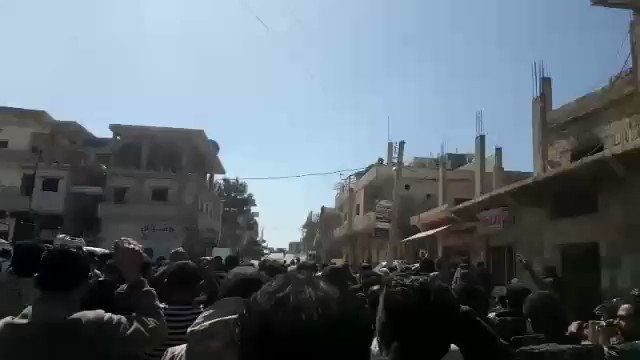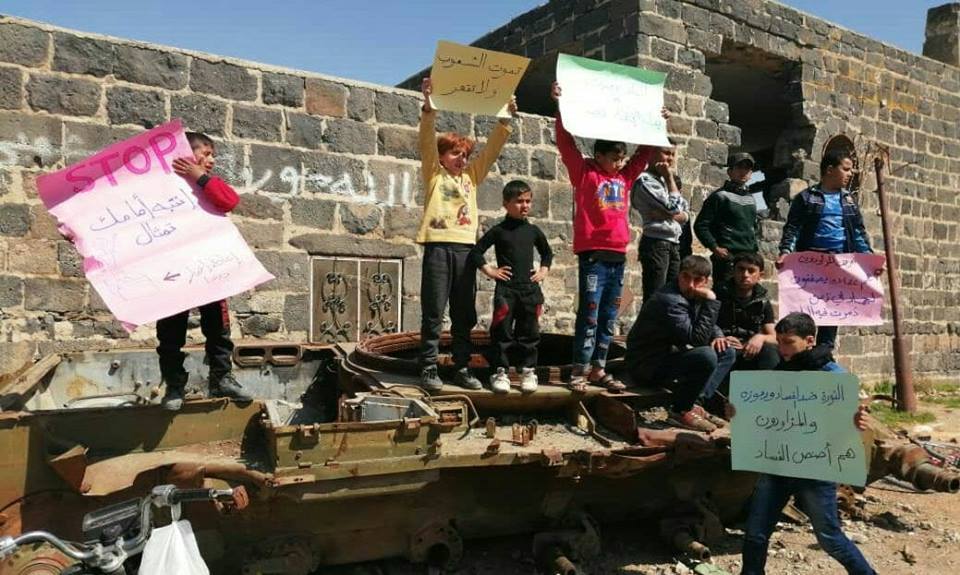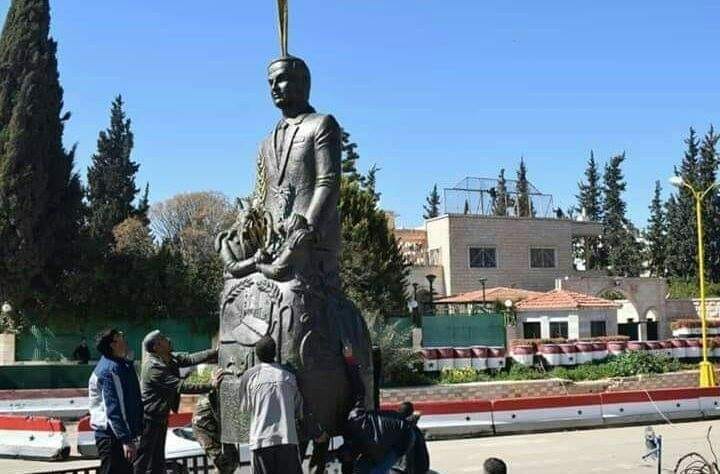
Mouaz Moustafa:
'It's really hard to sit here eight years in. We thought that when these protests cam out, calling for freedom and democracy, for the God-given rights we enjoy in the West, the United States, in Europe, and elsewhere, didn't think the brutality of the régime would be to this extent. But the winners right now are Iran, Russia, Hezbollah, extremists and their propaganda. Not the Assad régime. General McMaster, the former National Security Adviser to President Trump, said that 80% of on the ground troops for Assad are Iranian militias. It is the Russian air force that has bombarded and targeted civilians. So the winner isn't Assad. It is an occupation by Russia and Iran of our country because its people came out calling for their dignity.
Assad is merely a puppet. He's a puppet of Tehran, and to a lower degree, of Moscow. If you look at the areas he controls right now, he's unable to govern. Even some of his loyalists have been critical of the régime. They have to be careful, because anyone who shows any criticism, even loyalists of the régime, are tortured to death in some of the worst dungeons. Even though he has the Russian air force and Iranian ground troops, he still has not taken over the entirety of Syria, and even those in the "reconciliation" areas that came under régime control, have come out in protests in the last 48 hours, calling for democracy. He's there now, but he's more of a puppet than anything, and I think the Syrian people will still call out for their democracy, for their freedom, for their rights of self-determination, as long as they have the power to do so, despite the fact that the world has deserted Syria, has deserted our Never Again moment.
What's shocking is the Assad régime, Jamil Hassan who heads his Air Force Intelligence Branch, at one point announced that there are three or four million arrest warrants still out. Those refugees who essentially came back on the basis of guarantees that nothing would happen to them. were either arrested, killed, or forcibly conscripted to go kill their own people. The conditions in Assad's jails since Caesar - an incredibly brave humanitarian hero, not just a Syrian national hero, that brought out almost 55.000 pictures of men, women, children and elderly tortured to death - that systematic machinery of death, continues. It continues to kill people, it continues to torture people in the most sadistic ways. I was talking to a Holocaust survivor, and he mentions that he's hearing from victims of Assad's régime about the sadistic torture; he can't imagine that this is sort of OK in this century, that we allow this to happen, knowing we have the documentation, having someone like Caesar, a defector who documented on behalf of the régime what happened, and showed the world.
It is mind-boggling that we aren't doing more to stop him, and what's more disturbing is that the Assad régime probably holds more American citizens than any state or non-state actor in the world. So I call on President Trump, who has had a success record in bringing Americans home, to bring every American held by the Assad régime home, and to hold him accountable for what he's doing to his own people. There are a large number of foreign nationals being held in Syria today. The American families for the most part have decided not to go public, but I could point to one amazing family, who decided the bring their case publicly, the family of a man called Majd Kamalmaz, who is a humanitarian therapist, who was arrested when he went to visit his elderly family in Syria, he spent less than 24 hours there before he was arrested. This American citizen continues to be held by the Assad régime, as does Austin Tice, an amazing journalist. There are quite a few other who have not decided to go public yet, but even one American is one too many and they need to be home yesterday.
It is mind-boggling that we aren't doing more to stop him, and what's more disturbing is that the Assad régime probably holds more American citizens than any state or non-state actor in the world. So I call on President Trump, who has had a success record in bringing Americans home, to bring every American held by the Assad régime home, and to hold him accountable for what he's doing to his own people. There are a large number of foreign nationals being held in Syria today. The American families for the most part have decided not to go public, but I could point to one amazing family, who decided the bring their case publicly, the family of a man called Majd Kamalmaz, who is a humanitarian therapist, who was arrested when he went to visit his elderly family in Syria, he spent less than 24 hours there before he was arrested. This American citizen continues to be held by the Assad régime, as does Austin Tice, an amazing journalist. There are quite a few other who have not decided to go public yet, but even one American is one too many and they need to be home yesterday.
There are two ways to go. Either the world can continue to do nothing, and the Assad régime will slaughter millions. You have in Idlib, a province with three million people, one million of them children. You have countless civilians who continue to be targeted, and you have hundreds of thousands of people who are being tortured to death. If we do nothing about it, this will continue, this will empower more extremists. ISIS, al-Qaeda and others will point to this and say it shows the world doesn't care about the Syrian people, and try to recruit. And the Assad régime is very smart about manipulating and utilising extremists.
There is a ray of hope. There is a Bill in the United States Congress, called the Caesar Civilian Protection Act. It has passed the House three times. It has passed the House of Representatives on a voice vote. It has passed the Senate in a different form. I call on members of Congress, of the House and Senate, to put this at the President's desk at the nearest possible opportunity. I know the White House is in support of the Caesar Bill, which calls for the protection of civilians. I also call on the President, who has done this in the past, to continue to raise the alarm about Idlib, to continue to make it clear that Iran, Russia, and the Assad régime, cannot murder civilians in Idlib province which has the potential to double the number of refugees in Europe. I call on everyone, all human being, to know, that sometimes when the Holocaust happened we should all have been calling for the bombing of the railroads so that six million Jews don't get murdered. When Rwanda happened we should have stopped the machetes being shipped. When it comes to Syria, civilians are targeted, and men, women, and children, are tortured in prisons. It is our obligation to raise our voices, to do all we can, to put a stop to the killing.'

There is a ray of hope. There is a Bill in the United States Congress, called the Caesar Civilian Protection Act. It has passed the House three times. It has passed the House of Representatives on a voice vote. It has passed the Senate in a different form. I call on members of Congress, of the House and Senate, to put this at the President's desk at the nearest possible opportunity. I know the White House is in support of the Caesar Bill, which calls for the protection of civilians. I also call on the President, who has done this in the past, to continue to raise the alarm about Idlib, to continue to make it clear that Iran, Russia, and the Assad régime, cannot murder civilians in Idlib province which has the potential to double the number of refugees in Europe. I call on everyone, all human being, to know, that sometimes when the Holocaust happened we should all have been calling for the bombing of the railroads so that six million Jews don't get murdered. When Rwanda happened we should have stopped the machetes being shipped. When it comes to Syria, civilians are targeted, and men, women, and children, are tortured in prisons. It is our obligation to raise our voices, to do all we can, to put a stop to the killing.'







